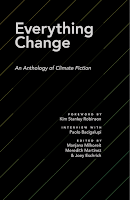
(Climate Change) A young girl and her grandfather are among the last people living in Venice when they get an evacuation order in advance of a toxic high tide. (4,985 words; Time: 16m)
Rating: ★★★☆☆ Average
This piece has extra value for anyone who's been to Venice and speaks a little Italian.
"Acqua Alta," by Ashley Bevilacqua Anglin (edited by Manjana Milkoreit, Meredith Martinez and Joey Eschrich), appeared in Everything Change (RSR review), published on September 29, 2016 by Arizona State University.
Mini-Review (click to view--possible spoilers)
Pro: This is primarily a story about how the narrator lost her past, and eventually reconciled herself to it. She despises her father and uncles in Venezialand for giving up, but even though she can honestly say that she was the last to go (and was even the last child actually born in Venice), she too finally accepts reality and thinks about the future.
Con: There's not much of an actual plot here. The narrator isn't trying to do anything except stay put, and she doesn't try very hard to do that. Things just happen, and she reports them.
There is a lot of symbolism in the story that seems opaque. Why is she carrying around Le Città Invisibili? What's the meaning of the annual glass sculptures?
Other Reviews: Search Web, GoodReads.com
Con: There's not much of an actual plot here. The narrator isn't trying to do anything except stay put, and she doesn't try very hard to do that. Things just happen, and she reports them.
There is a lot of symbolism in the story that seems opaque. Why is she carrying around Le Città Invisibili? What's the meaning of the annual glass sculptures?
Other Reviews: Search Web, GoodReads.com
No comments (may contain spoilers):
Post a Comment (comment policy)